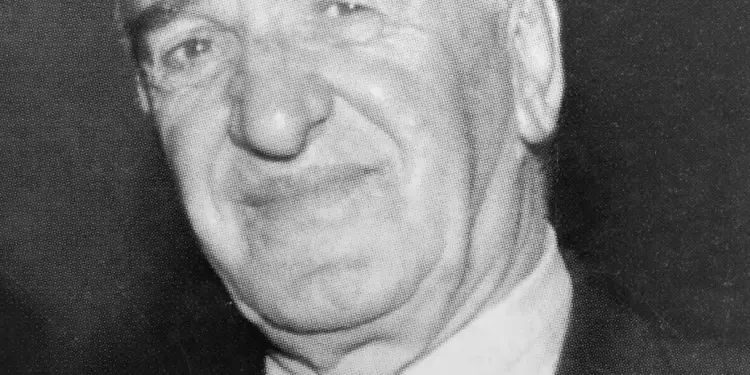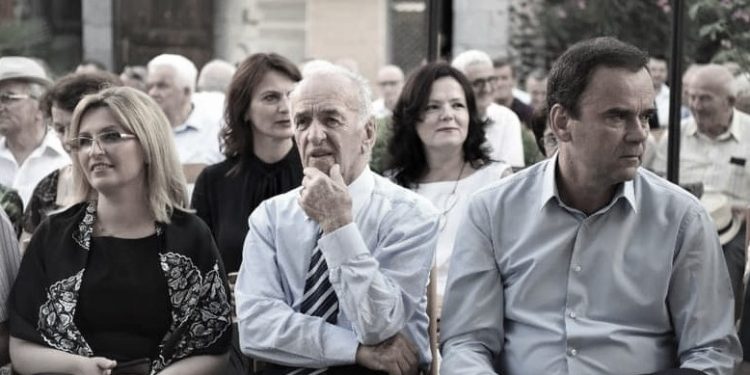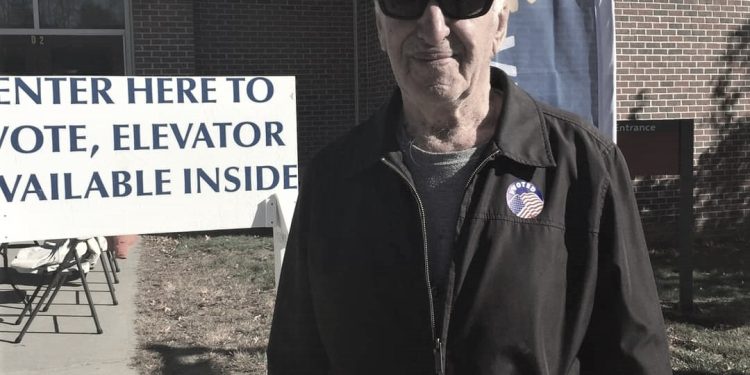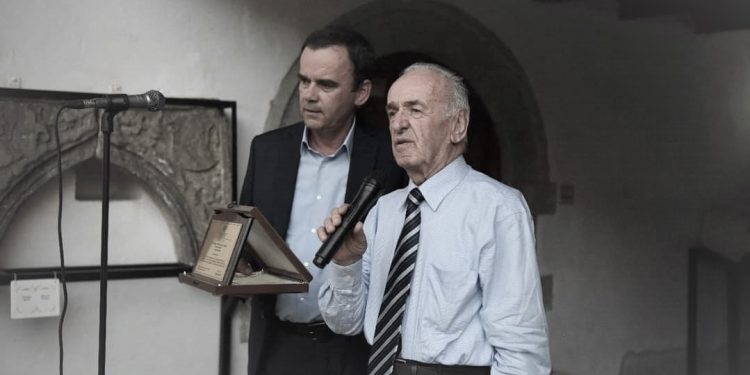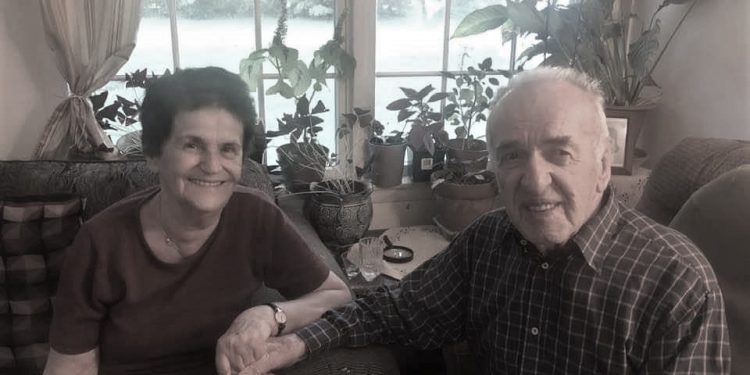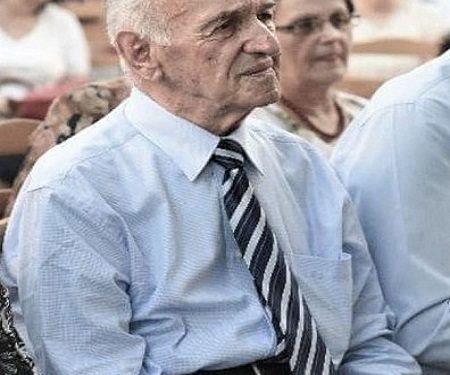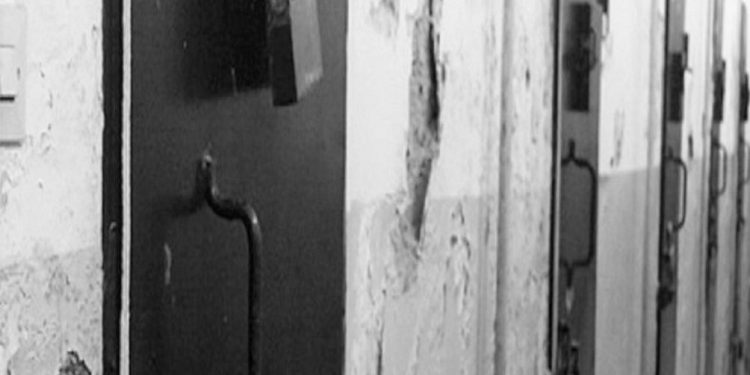By Ahmet Bushati
The first part
Memorie.al / Ahmet Bushati were born in Shkodër in 1929, in one of the well-known families of the large tribe of Bushatllinj, and he is among the first to join the Anti-Communist Movement of Shkodra Students, in the first years after the end of the War. He was arrested and sentenced in 1948 and served a total of 7 years in prison. After leaving prison, he works as a worker and later a forest technician in the district of Kruja. He completed the Faculty of Philology by correspondence in the Language-Literature branch and studied foreign languages, such as: Italian, French and English. In 1991, he returned to Shkodra, where from 1992 to 1996, he served as the chairman of the Shkodra District Municipal Council. He is also one of the personalities of the Association of Former Persecuted and Political Prisoners of Shkodra. He has occasionally published articles in the daily press, as well as memoirs, mainly about the crimes of Enver Hoxha’s communist regime, as well as his sufferings in camps and prisons.
The memories of Ahmet Bushati
Three months between life and death
My new investigator would be a young man named Ali Xhunga, (he came to Shkodër from the villages of Përmet) with the low rank of aspirant, which showed that even in the war he had not gone at the right time, with all the suitable age he had. He was quite short from the body and, when he happened to come close to me and shouted and threatened me, I felt like shaking from anger that I felt a flame under me.
Short as he was, he sat them in chairs, puffed and puffed up like a rooster, and to make them look important, he artificially took serious poses. This careerist investigator, while not being the most ignorant or the most brutal, just like the criminal, was very dangerous for the victim that he had served to investigate, just because he was a coward and very subservient to his superiors. If it happened that during the investigation someone was imprisoned, he entered the office, e.g. boss, he would immediately go numb and turn white in the face, out of fear. According to me, he lacked any personality, even the negative personality of a criminal. Surely he was the type of a bad kind of mercenary, who had been put in the service of crime for profit.
It would be the investigator Ali Xhunga, the one who would keep me hanging like Christ for three months in a row, and as if that wasn’t enough, in any case, he would also torture me with other tortures, so that I would necessarily have to go to trial. . Trial or death would be the motto of his criminal work with me. From the first day of the investigation to the last, he had me abandoned in the most extreme torture of death, death which, for a long time, would be my only hope, and if I did not die, what to an inexplicable miracle of my fate!
When I was called by him for the first time, I found him waiting for me, sitting in a chair, serious and with an imposing attitude, just as he must have thought from before. “Sit”, he told me coldly and with the intention of intimidation, he continued to remain silent and seemingly thoughtful for a while. Meanwhile, as usual, I looked at the calendar, to know the date and day, and I quickly noticed that on the wall, it marked July 28, 1948. Then he waved his hand with authority towards me, he would say: “I am the last investigator dealing with you. To talk, you will talk that you don’t, but the thing is that you don’t get there, that you are young and that you also have a family, but in the end we don’t ask about anything at all, not even about your life. How much has this country seen and what men! Its mind boggling, so think about it before it’s too late”!
The next day of that day, he called me again and then, angry at my silence and silence, he left his chair and spoke to me in his tone: “I know you are waiting for them to come, we will first We slaughter you all there, among the dungeons where we have you, dungeon by dungeon and one by one”.
There was a month that Enver Hoxha broke with Yugoslavia, and the political situation abroad could have been frozen, as I would not have known then or even a few months back.
On the third day, Ali Xhunga welcomed me, as they say, with the first: “Did you think”?! – He asked me and I answered as always: “I have nothing to think about”. He jumped mechanically from the chair and without speaking, as short as he was and dressed as always military, serious and with a determined step, dueled outside in the corridor, from where a policeman entered to guard me. He returned together with another soldier, whom I had never seen and would never see again, who in this case was holding the power generator.
“Do you see this”, Ali Xhunga asked me ironically and continued: “Do you know what it is?” And I answered with “Yes”. “Then try again today”, he said nervously. That dry officer twisted the wires between my ears, while Ali Xhunga, with a generator in his hands, caused me to crash several times with force on the floor, foam coming out of my mouth, like the next time and my ear still not healed well, blood flowed again and it hurt more than last time. This session, difficult as it was, did not last long.
After lunch that day, Ali Xhunga, Ismail Lulo and the deaf woman, who was holding a rope and a stool in their hands, rushed into the dungeon. When Ismail Lulo pulled the rope from the deaf man’s hands, I thought they were going to start with him. I didn’t know hanging existed as torture. Shurdha, by the order of Ismail Lulos, took out the spoils of sleep, while he himself started the hanging procedure. Neither spoke. Ismail Lulo, first, put the chains in my hands and tightened them according to my pulses, he supported me on the corner of the wall, right under the window, and he himself got on a bench and then went under the chain, the rope, the two threads and he tied them together to the bars of the window, to tighten them to the point that he was completely strained.
Ali Xhunga, who until then had remained speechless and with his hands tied behind his back, to seriously watch the implementation of his order, would only speak when he said: “Now you see”! Ismail Lulo also came out after him, leaving me only in my panties and a thin summer silk shirt with torn buttons, two days ago in the investigator. So Ali Xhunga, was thinking about doing what he had with me, they told me on the first day: “I won’t deal with you for long”.
Hanging on the rope with my head bent to the side, constantly with my mouth open, so that I could breathe and freeze at that point of heat, with strong pains between the pulses, where the whole body of the hanged man was heavy and from the lack of blood circulation among them, they were swollen and had started to tear them from the chains, which were cutting them like a razor, with their eyes constantly closed, from great fatigue and long sleeplessness, it would be more or less my general state, during those days. It would be only death, on which I had depended my salvation, the end of those torments, which are not expressed in words; death as the only hope with which I would push a mountain, for endless hours, for many, many days to come. It would seem to me as if a second self-had entered inside me, which gave me the heart to speak to me: “The more the suffering increases and the more time passes, the more I was getting close to that death, where you wait for me to rest”.
At dinner time, they chose me to eat a piece of bread, with a tomato seed and sometimes with two or three figs, which I either pushed hard, or didn’t even touch. In order to tease my weakness, they were often the safeties of the house; we were often associated with some fruit of the time. They would bring them near the door of the dungeon, so that when they took me to the interrogator, or when I went out for personal needs, I would see them with greed.
When they chose me, i.e. at dinner, I had a problem sitting down, because my legs were very swollen, up to the top of my thighs, they were gray and like two thick wooden bodies, which did not break between my knees. So I, in order to sit down, would go slowly – slowly, holding on to the wall, until a point when, unable to continue the descent, I would collapse on the cement myself, with my legs spread. I didn’t feel like eating at all, but I was very thirsty for water, more than anything, excluding the pain, I needed sleep. At every dinner, as soon as I had barely pushed three or four bites of bread, I would immediately fall asleep, so Ismail Lulo woke me up and hung me up again, some twenty minutes later. After the first three or four days, that I was hanging, we ran out of sleep as I was and as always constantly looking down, I would say to myself how many times: “Don’t die without sleeping once more on this cement”, that I coveted him so much with my eyes.
First, I would be hanged by my hands, but when, as the days went by, the chains penetrated between my wrists and spread their flesh, the hanging would be passed between my shoulders, and when after a few more days they would also to be torn as if by a razor, from the rope and had turned completely into wounds, they would change place again to the hanging, but not by grabbing it between the pulses that still continued to be living flesh, or as the case may be, with blood and pus inside, but between the arms and to return as after the turn, again from the beginning even though from there and back, they would be constantly in a state of wounds. Only the belief in a quick and certain death gave me the strength to endure.
From pain and insomnia, almost all the time, I would pass into a severe hallucinatory state, not knowing where I was for days and hours, and one more day would come at the end, so that I would no longer take myself for anyone. , but for animals. However, in a flash, my consciousness would be fully enlightened, but especially the investigator Ali Xhunga appeared in front of me, who would seek to take advantage of that uncontrollable state on my part. It would happen to me several times, because I couldn’t get enough of my breath, I would get such powerful spasms, my mouth would fill with foam and I would be in such a state that, from moment to moment, I expected that eventually, my breath would it was taken all over and especially in three cases, I say that I should have died for sure, if they would not have intervened in time, with medical help. On at least two occasions I have been conscious enough to recall, albeit vaguely, a man in a white T-shirt running toward me with a long aga in his hand.
During this period, Ali Xhunga, as if hanging me wasn’t enough, he would sometimes shoot to impale me, even though my body was covered in wounds and smelled like a dead animal. !
The new prison
“Burgu i Ri”, which in terms of size, came second after the Great Prison, was a two-story building. Very soon, we would learn that that building in the past had been the home of the Çeka family, and some others, who knows for what reason, so that prison, as the case may be, would also be called the “New Prison” and the Czech Republic.
Behind the entrance gate, there was a corridor about 3m long, inside which a room for the service police was designed, using for that purpose, two existing sides of the corridor itself, while the other two sides would consist of two walls bars, which went up to the ceiling. Inside this room, that first night, they untied our hands, to take us to the rest of the corridor, which had two doors on the sides and a third one in the front, above which were marked the numbers 1 on the right, 2 on the left and 3 on the front. . While the two rooms on the side, i.e. 1st and 2nd, were raised by a foot of stairs and covered with boards, the well-known stoves of Shkodra, the one with number 3 stood in the lower quota of the corridor and was covered with cement , perhaps an ancient cradle, which stretched as long as the entire building.
Ruzhdi Çoba, Thabit Rusi, Qazim Dervish, Lec Barbullish, Ruzhdi Baja and Refik Bushat were put in room no. 1, in the one with no. 2, entered Ernest Perdoda and Xhela Bacin, while in no. 3, Remzi and Xhevat Quku, Tom Sheldi and me.
When we entered the room saying hello, we noticed that it was immediately completely quiet. As we would learn later, this sort of thing stuck by it whenever a new inmate was brought into a prison cell. The inmates of the room were standing in front of their pillows wrapped and leaning against the four walls of the room and looking intently at us. It was not difficult to read their curiosity and pity for us in those moments.
The entry of each new inmate into the room marked an event for her fellow inmates. It has some of its own prison rules, back to tradition. It happened that in a room the young prisoner found his cousins or acquaintances, and in such a case, they are the ones who will be the first to meet him, ask him about his imprisonment, if he suffered during the investigation or not, for the people of the house, if he had contact with them and very quickly, this information is transmitted from there by word of mouth, around the room, thus quenching everyone’s curiosity.
…In addition to some of the friends with whom I entered this room, I would also find Ramadan Sokol, the brother of my friend, Hodo Sokol, who would stand close to me and lead me to that prison room with, perhaps, over a hundred people. I found Ramadan by reading “Rilka”, as well as engaging in collecting folklore, work that he continued with passion. Or wasn’t that prison a gold mine to explore! I had something to gain from Ramadan Sokol, with a decade of life more than me, with an immense number of books to read.
… There, apart from the Katundari of the Shkodra plain, the highlanders of the Great Highlands and Dukagjin, the areas of Mirdita, Puka, Tropoja and Luma would also have many representatives. Ramadan, who had studied flute and composition in Florence, with his background as an artist, there in prison he would also dabble in painting, engraving on wood and on alumite pages, he would produce miniatures from peach cores, objects such as “shove”, “basket”, etc., which were taken out, as prison gifts for family members and relatives. Yes, Ramadani would also take up embroidery; he would also work in “loom”.
Through books, he exchanged with his fellow prisoners, such as: Drita Kosturi and Terezina Pali, who had a room at the entrance from the outside, called the “women’s room”, and with whom Ramadani would correspond, with part of a “code”, code to extract e.g. the word “patience”, he would put a pale dot with a pencil, under the first letter “d”, so that the page of the book would have, to continue with the letter “u”, which came after it and so on, until the word patience came out in full, to continue in this way, with all the words that a letter of his would have.
At the end of our long room, there was an exit to the bathroom, where my friends and I, after a year and a half of not having showered, would throw water on our wormy bodies for the first time. At dinner, a man in his thirties, who served there as an orderly and as a doctor, pulled my panty elastic without warning (and in front of others), released two or three fistfuls of D.D.T. in there and left laughing. D.D.T., they threw it at us for lice work. The person who performed that service was the pharmacist Elez Troshani, whom I had once known by face, but that night, we put his shaved head and a fez on him anyway, they had lost all traces of his good looks, which he had after he had been free.
The prisoners we found there were generally old, or sick, incapable of physical work, while the rest of the prisoners, which constituted the majority, happened to be in and out of the Orman Pojani labor camp, area of Korça, from where they would return to the Shkodra prison, during the month of November, when we would also move from the New Prison, to join them.
This prison room, with light and many good people, after a year and a half of reading “Voice of the People”, which was usually carried out by Andro Petroviçi, a gentle and very kind man, but whose face I don’t know why he would there was always something to grieve.
Twice a day for an hour we were taken out to the large yard, which fell behind the building, an exit that we young people would use to play basketball with goals without football posts and we were divided into two teams, one representing the room’s No. 1. and no. 2. the other is our no. 3.
… Our room with no. 3, had the shape of a rectangle, so to speak, the heads of the place in it, although close to the exit to the bathroom, were occupied by the oldest, who also had physical problems, such as ex-soldiers Luigj Mikeli, Hamza Kuçi, Zef Martini, Paulin Prendushi and after them, young ones, like Teufik Bekteshi, who suffered many times from severe clavicle pain, and so on: Hamis Nurja, Malo Kraja, Malo Cani, Smajl Elezi, etc.
… As early as the first night of my arrival in this prison, they had me placed between Ramadan Sokol and Pjetër Saraçi, to give me pleasure, since the next day he would start performing some of his numbers.
Simon Harapi would be one of those imprisoned, with whom I befriended since my first days. Prison, as a place of life and shared destinies, would eliminate many of the differences that exist between people, such as age, culture, origin, worldview, etc. Simon, a calm, measured man, extremely orderly in everything, would spend most of his time in solitude, and I had the impression that during that time, apart from thinking about his family, he could to also evoke a part of his distant youth, with the secrets he had in love, pure love, that he had trusted to me. Memorie.al
The next issue follows




